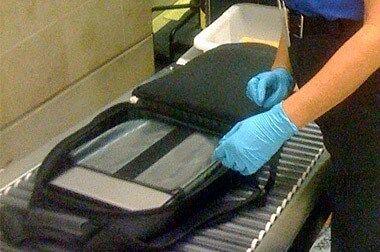 Just this week, en route to Israel through a British airport, I observed a young family being held up at security. Despite the fact that he had a newborn infant strapped to his chest in a baby carrier and was accompanying his wife and young daughter, the young man was subjected to multiple pat downs.
Just this week, en route to Israel through a British airport, I observed a young family being held up at security. Despite the fact that he had a newborn infant strapped to his chest in a baby carrier and was accompanying his wife and young daughter, the young man was subjected to multiple pat downs.
Struggling to hand over the baby while juggling with items of clothing and luggage, this was clearly an inconvenient and unpleasant experience being meted out to a family that should not have raised any security concerns. Finally it was discovered that metallic buttons on the baby carrier had set off the security scanner alarm.
I mention this as just one example of how, in a post-9/11 world, all of us have been affected by the increasing levels of security checks at airports.
[sc:midsignup]But it seems that Israel’s airport security procedures are the only ones that can induce almost righteous indignation in the media.
As the Associated Press reported: “Israel’s attorney general on Wednesday upheld a practice to allow security personnel to read people’s email accounts when they arrive at the airport, arguing it prevents militants from entering the country.”
Cue dramatic headlines that overstated the story to the point of being misleading as well as adding a sinister backdrop to the story. For example, this headline in The Australian:
This from the Sydney Morning Herald:
This from The Guardian:
And this from the Daily Telegraph:
You could be forgiven for thinking that Israel is a police state comparable to North Korea. This is, of course, not the case. While Israeli sources do not give out information regarding just how many foreign visitors are stopped for more extensive questioning at Ben-Gurion Airport, with a record 3.5 million visitors to Israel in 2012, 2.5 million of them arriving by air, it is quite reasonable to conclude that the vast majority of these visitors entered Israel unhindered.
And lest Israel be accused of deliberately targeting non-Jewish visitors, that would actually make up the majority of incoming tourists, 58% of which is Christian with only 23% Jewish.
Allowing security officials to check email accounts of persons deemed suspicious in their presence is a legitimate issue for debate, hence the need for Israel’s attorney general to rule on its legality.
However, in addition to irresponsible and inaccurate headlines, the news outlets above painted the issue almost solely as one of individual human rights and issues of privacy. (Note: The Australian used AFP copy while the SMH relied on Reuters.)
The direction or balance of an article can be influenced by what is omitted as much as what is included. So credit to the Associated Press for balancing its own reporting of this story with some extra context (emphasis added):
One aspect of the issue is that most people entering Israel obtain visas at the airport or other border crossings. Unlike many countries, Israel does not require people to obtain visas from their embassies in advance of their trips, eliminating possible screening before visitors arrive in Israel.
In contrast, Israelis themselves are required to obtain visas far in advance before visiting many countries. Even the US requires an exhaustive interview process at its embassy in Tel Aviv, and it does not grant visas to all who apply. Iranian-born Israelis, for example, are often refused visas.
The practice of email checks appears to be a step beyond what some Western countries allow, while others permit similar measures.
Germany does not allow such searches. The US Department of Homeland Security has seized computers and other electronic devices from people arriving in the United States to search them.
In a narrow ruling last month, the Ninth US Circuit Court of Appeals ruled that while Customs and Border Protection officers can do “a quick look” at a laptop computer or other equipment, reasonable suspicion is required for a more in-depth forensic exam of electronics. It was not immediately clear if that included email.
Pointedly, the Daily Telegraph also republished the AP story except it chose to edit out the above paragraphs.
Credit, at least, to the Star Tribune, which used the following headline to accompany its AP story:
The unfortunate reality is that Israel, perhaps more than any other country, has to place security over everything else when it comes to its borders. Like every other state, Israel has the sovereign right to decide who is allowed to enter its territory, including foreign activists who may be hiding their intention to cause trouble.
You can take action by writing to The Guardian – [email protected], The Australian – [email protected], and the Sydney Morning Herald – [email protected]
[sc:bottomsignup]
Image: CC BY-SA HonestReporting.com, flickr/mobileedgelaptopbags.
[sc:bottomsignup]




